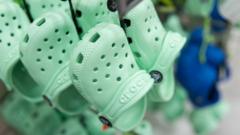Crocs' stock plummets to its lowest point in three years following projections of a 10% revenue decline, fueled by hesitant consumer behavior and economic challenges.
Crocs Faces Significant Stock Decline Amidst Changing Consumer Spending Habits

Crocs Faces Significant Stock Decline Amidst Changing Consumer Spending Habits
Shares tumble nearly 30% as the footwear company anticipates reduced sales, signaling caution among US shoppers.
Shares of Crocs Inc., the iconic American footwear brand, have experienced a startling decline of nearly 30% as the company grapples with changing consumer spending habits in the US. The footwear manufacturer anticipates a revenue drop of about 10% for the upcoming quarter compared to the previous year, citing a decrease in foot traffic to its stores.
Andrew Rees, Crocs' CEO, noted a "cautious" approach among US consumers regarding discretionary expenditures, contributing to the company's current financial woes. Following the announcement, Crocs' shares hit their lowest mark in almost three years, suffering the largest single-day drop in nearly 15 years.
The company expressed concerns for the latter half of the year, influenced by the soaring cost of living and possible ramifications of US trade policies. Chief Financial Officer Susan Healy indicated that rising tariffs could lead to an estimated $40 million (£29.8 million) hit through 2025.
Rees is optimistic about mitigating these tariff impacts through cost-saving measures within Crocs' supply chain, but admits that the current landscape shows many customers are now exhibiting "super cautious" spending habits.
With warnings of reduced discounts on products, Crocs anticipates that sales may continue to be affected. Nevertheless, Rees pointed out a shift in consumer preferences toward athletic products ahead of significant sporting events, including the upcoming 2026 World Cup in the US, Mexico, and Canada, as well as the 2028 Los Angeles Olympics.
Despite these challenges, Crocs reported a slight uptick in second-quarter revenue of $1.1 billion, reflecting a 3% increase from last year. The company, which acquired casual footwear brand HEYDUDE for $2.5 billion in late 2021, faces a complex retail environment moving forward.



















